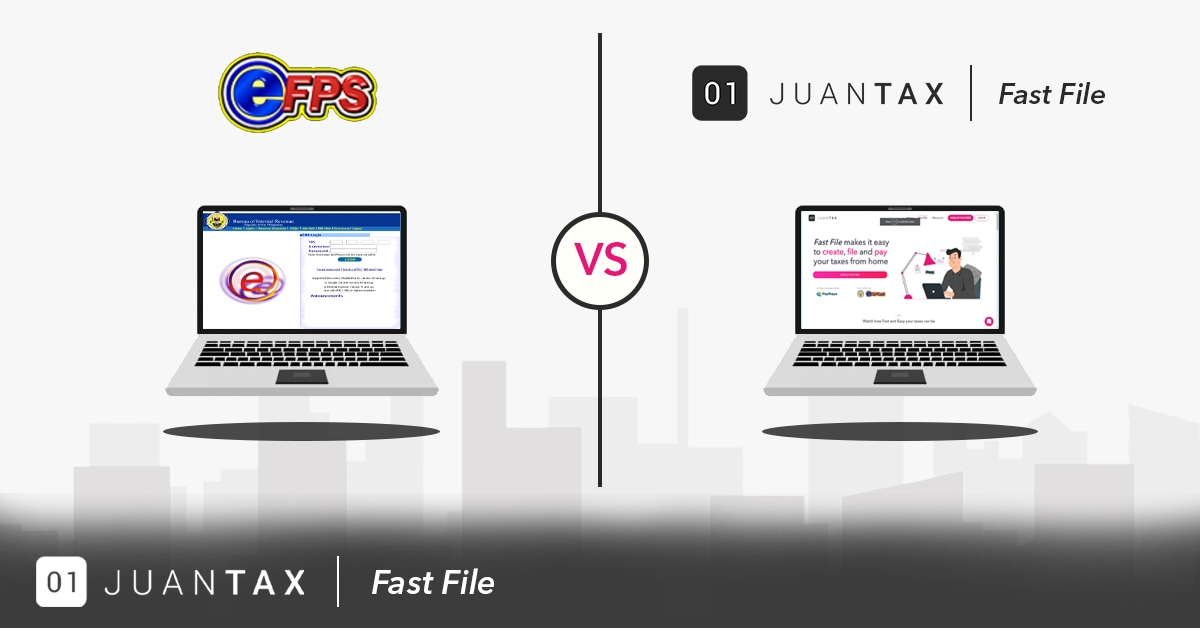Filing your taxes used to be overwhelming before e-solutions became readily available in the country. To make it easier for you to prepare, file, and pay your taxes, the Bureau of Internal Revenue (BIR) opened digital filing channels and partnered with third-party providers that will allow you to comply with your tax requirements in one platform.

These e-tax payment solutions include the BIR eFPS and JuanTax’s Fast File. Each online payment channel allows you to file and submit your taxes on time, wherever you may be.
But what’s the difference between Fast File and eFPS?
JuanTax Fast File
BIR’s first accredited tax platform, JuanTax, recently launched an online tool to allow you to file and pay your taxes online. Through Fast File, taxpayers and accredited tax agents (ATA) can successfully use the online tool so you can easily comply with your tax obligations all in one place.
Fast File adheres to the guidelines set by the BIR for third party electronic solutions, ensuring that taxpayers like you can manipulate your tax requirements in a secure, convenient, and easy manner.
You’d be glad to know that Fast File is also in a strategic collaboration with PayMaya so you can pay your taxes directly.
How to get started with Fast File
Compared with BIR’s eFPS, Fast File is much easier to set up. Here’s how you can get started:
Step 1: Visit https://fastfile.juan.tax using your trusted internet browser.
Step 2: Click the Sign-Up button and fill out the information needed to set up your account.
Step 3: Choose your classification as Individual or Non-Individual
Step 4: Select the form you want to file
Step 4: You’re now ready to generate, file and pay your taxes
Who should use Fast File?
Fast File aims to give all Filipino taxpayers to use a more convenient tax e-payment solution. This covers individuals who are earning purely compensation income–including resident alien and non-resident citizen with respect to compensation income in the Philippines. Likewise, it also caters to the tax preparation, filing and paying of foundations, cooperatives, charitable institutions, non-stock and non-profit organizations.
How do you pay your taxes through Fast File?
There are four different ways to pay your taxes through Fast File:
- Use PayMaya
- Pay through Credit Card / Debit Card
- Coins.PH
- Use your UnionBank account
BIR eFPS
eFPS or Electronic Filing and Payment System is a platform developed and maintained by the BIR dedicated to the electronic filing of your tax returns.
Through eFPS, you can pay your taxes through an internet-banking service via debit from your enrolled bank account. Here’s a short guide on how you can get started.
How to get started with eFPS
Step 1: Visit www.bir.gov.ph using your trusted internet browser.
Step 2: Click the eFPS button on the home page.
Step 3: Enroll yourself by filling out the enrollment form then click submit.
Step 4: Wait for an e-mail from BIR regarding the status of your enrollment. If your application is approved, instructions to help you e-file and e-pay your taxes through eFPS will be sent to your email.
Who should use the eFPS?
The eFPS platform is best for use by the country’s top 5,000 individual taxpayers and the top 20,000 private corporations, stockbrokers, and national government agencies.
How do you pay your taxes through eFPS?
There three ways to e-pay your taxes:
- Fund transfer thru accredited online banking systems
- Tax Debit Memo (TDM)
- Tax Remittance Advice (TRA) – For National Government Agencies
Filing your taxes doesn’t have to be complicated especially now that there are e-solutions available to help you comply with the comfort of your home. As the government is still implementing Enhanced Community Quarantine, now is the best time to accomplish your tax obligations.
DISCLAIMER: Taxpayers who are required or have already enrolled in BIR’s eFPS are not permitted to use any other online tax platform, including Juantax’s Fast File. Other platforms may be used if BIR grants permission (via a memo) or if the required forms are not available in eFPS. The bureau will penalize noncompliant taxpayers.










